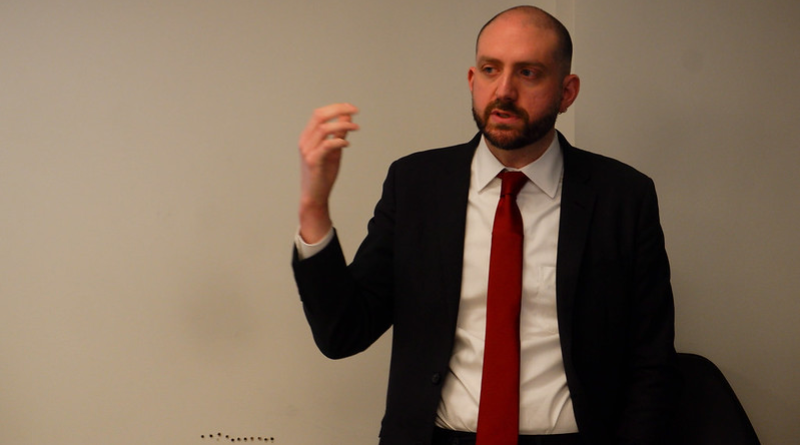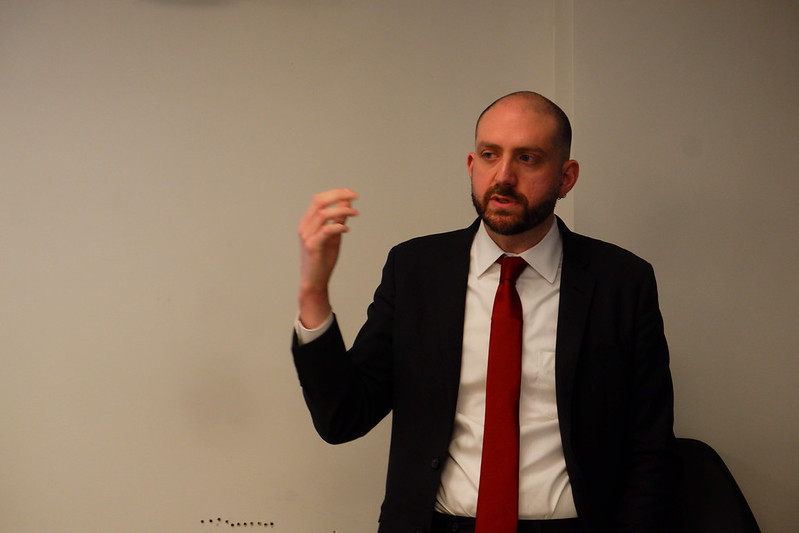Alessandro Iandolo Explores “Arrested Development: The Soviet Union in Ghana, Guinea, and Mali, 1955-1968” at Fletcher
By Sarah Baughn, MALD 2024 Candidate, The Fletcher School
On March 29, 2023, Dr. Alessandro Iandolo shared insights from his new book, “Arrested Development: The Soviet Union in Ghana, Guinea, and Mali, 1955-1968” at The Fletcher School at Tufts University. Dr. Iandolo is a lecturer in Soviet history at the University of Oxford and a Marie Sklodowska-Curie Fellow at the Davis Center for Russian and Eurasian Studies at Harvard University. His book, released in 2022, took center stage in a discussion that delved into historical and geopolitical dynamics.
“The history of development is intertwined with the history of decolonization in the Global South. Ghana, Guinea, and Mali were some of the first to become independent under the guidance of charismatic leaders with radical ideas for transformation,” Iandolo stated.
Iandolgo explained the political situations within all three countries, and why they gravitated toward the Soviet model of development.
“In the early years of the Khrushchev era, the Soviet economy had been performing incredibly well, outperforming many other economies in certain ways, including the U.S. economy. Though I don’t want to rely on numbers–what matters more is the idea that Khrushchev presented fast economic development and success.”
Iandolo cited projects like the Virgin Lands Campaign in the 1950s, which made “Soviet food development explode for a few years.” This, along with Sputnik launching shortly before Ghana became independent, generated a lot of interest in the Soviet Union in the Global South.
Projects like the Bratsk Dam in Siberia appealed to the new governments in Ghana and Mali. “The West African leadership hoped to obtain advice on how to organize, collect material, identify the best tools and machines…as well as how to build creation systems, transport, energy, infrastructure and so on,” Iandolo explained.
Between 1958 and 1960, the Soviet Union signed comprehensive treaties with all three countries that committed them to providing over $100 million to finance projects and infrastructure in the agricultural sector.
“It’s not a story with a happy ending, I’m afraid,” he said. Three different projects in Mali, Guinea, and Ghana were eventually abandoned by the Soviet Union from 1955 until 1968.
In Guinea, a poor nation of approximately three million people, the quest for a dependable energy source to fuel machinery, construction, and widespread electrification led to the pursuit of an ambitious dam project. The chosen location along the Konkoure River offered strategic advantages, yet the rugged terrain presented formidable challenges. As projected costs soared beyond initial estimates, the undertaking was eventually abandoned, marking a setback in Guinea’s energy ambitions.
In Mali, a landlocked nation, the Soviet Union collaborated with the government to construct a railway connecting Mali to the Guinean coast to foster trade. However, building a railway required navigating unpredictable rivers, dense forests, and large distances between the cities. All the construction material and equipment had to be transported from the Soviet Union, leading to a much higher cost than was initially expected. The project was eventually abandoned with less than half of the railway finished. Mali still seeks potential sponsors to complete the second half of the railway construction.
Finally, Ghana’s relationship with the Soviet Union was based around its desire to grow its agricultural industry. Ghana possessed more financial resources than the other two nations due to the way the United Kingdom colonized and consolidated Ghana’s cacao industry, and the government’s primary concern was its ability to produce sufficient food for its population beyond cacao beans.
In 1960, the Soviet Union and Ghana signed a large-scale corporation agreement protocol for the creation of collective state farms for the country. Some of these farms actually came into existence, but did not survive for more than a few years because the Ghanaian government could not afford to pay the Soviet managers’ salaries long enough for them to train Ghanaians in how to run the farms.
“What the Soviet Union hoped to build in these three states was certainly not communism or a Soviet-style government, but the creation of what was called the large state sector in the economics of the region…The creation of this large state sector system was to make the local governments more in control of their economies and less dependent on the outside world,” he explained.
In his book, Iandolo argues that the Soviet Union should be seen as a pioneer of a ‘mental state’ about potential development avenues.
“The projects were not inherently socialist,” he concluded, but were characterized by “the determination to design every project…on collective terms, which was not a trivial difference. It mattered to the governments of these countries because they believed that the socialist approach was the best one. Whether that’s right or wrong is something we can discuss for a very long time.”
In response to an audience question about why he chose to focus on these specific countries, Iandolo responded “These were the only three countries that developed interest in the Soviet Union at the time, and the only three with radical enough governments willing to experiment with socialist experiences. Outside of that, size is very important. All three were relatively small in terms of population and the size of its economy, which means that Soviet investments had a very large impact on the economies of these countries.”
Another audience member asked whether former colonizers of these countries intervened in the development process. Iandolo replied, “Yes, absolutely. France and England were relatively similar in their willingness to maintain ties to their former colonies. The British presence in Ghana was very strong. The head of the central bank, the police, and the military were all white British men. They were technically working for the government of Ghana, but they were citizens of a different country. It was very difficult for the Soviet Union to sort of break the system and become an economic actor in this context.”
In response to a question about the Soviet Union’s influence on development of these countries over time, Iandolo concluded, “Soviet action certainly has an impact. Overall, it’s hard to assess. But it’s difficult to deny that cooperation with the Soviet Union had a negative impact on these economies.”


